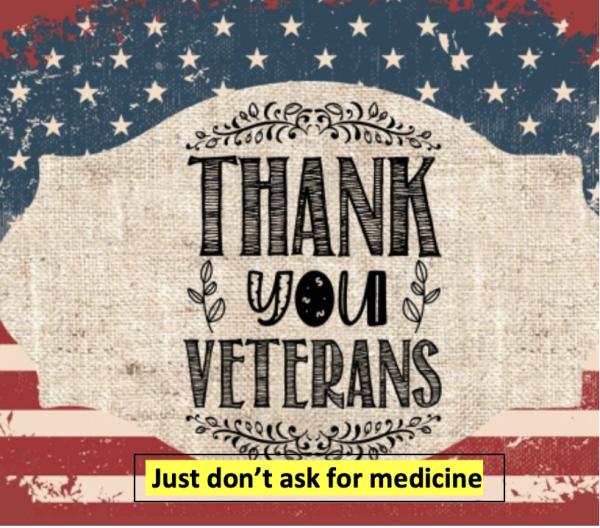It's easy for politicians to make speeches or for cities, towns, and sports teams to put together a tribute to our veterans. It is far more difficult to actually take care of their needs, especially when it involves providing medically necessary pain control for the many vets that come home seriously injured.
A 2015 article in Rolling Stone (even a stopped watch...) detailed some of the appalling inadequacies of veteran care, especially as it relates to homelessness and unemployment.
The number of homeless Vietnam veterans today is greater than the number of soldiers who died during the war. Tessa Stuart, Rolling Stone Magazine, 11/11/15
But the cruelest treatment of vets is arguably that they, just like many of their civilian counterparts, have suffered the barbaric practice of forced tapering of opioid painkillers. But with veterans, this "inhuman human experiment" is heaped on top of the other problems that are unique to vets, especially those who have been injured in combat.
Of particular interest are two articles that appeared in VA News, which is published by the Veterans Administration. They reveal the agency's true beliefs about treating veterans with pain. It is maddening.
The first article (2019) is titled "VA study uncovers a critical link between pain intensity and suicide attempts." Although the VA acknowledges...
"Even when we take [risk factors such as PTSD, anxiety, and depression] into consideration, moderate to severe pain intensity is associated with suicide risk"
...but then the agency immediately shows its hand: [Emphasis mine]
Veterans have several treatment options through VA to cope with pain and reduce pain intensity. Nonmedication interventions are considered first-line treatments.
Really? This means that the VA believes that veterans in pain should first try (and often) fail with a chiropractor or acupuncturist before medication is even considered. Exactly how long does the VA want their vets to suffer while undergoing nonsensical therapies before they even take an Advil, let alone a Vicodin pill?
Dr. Jeffrey Singer, a practicing surgeon, a senior fellow at the Cato Institute, and an ACSH advisor had this to say:
In its anti-opioid zeal, the VHA health system embraces so-called "alternative" pain treatments or uses drugs developed to treat other conditions "off-label," in most cases with no basis in scientific evidence. Remember that doctors were chastised for treating COVID with off-label drugs not backed by "the science." Yet the VA is encouraging the use of untested pop science remedies on veterans in pain because of the irrational fear of using opioids—drugs repeatedly shown to be safe in the clinical setting.
J. Singer, MD, private communication 11/10/2022
Even worse is this "advice" to veterans who live in pain: [Emphasis mine]
Be honest about the pain you’re experiencing. An important step in managing chronic pain is accepting that it is part of your life. Accepting the presence of pain can help you move on and engage in enjoyable and everyday activities despite that pain.
This passage is particularly galling because it implies (or says directly) that vets lie about their pain, that there are no ways to control it, and that they should just shut up and "enjoy" their painful life. How different is this "advice" from that of former Attorney General Jeff Sessions? (See 'Let Them Eat Aspirin' - Jeff Sessions' Painfully Ignorant Remarks.)
“People need to take some aspirin sometimes and tough it out a little.”
Attorney General Jeff Sessions, 2/7/18
Is it any wonder that veterans with unmanaged pain are killing themselves?
Veteran suicides from opioid deprivation
There are numerous studies and articles on the relationship between pain and suicides in veterans. Here are sections of three of them. This sample is not meant to be comprehensive.
Research demonstrates a high prevalence of chronic pain among veterans. A limited cohort study (n = 340) of OEF and OIF veterans found 81.5% experienced chronic pain. Many other studies show that a concerning number of veterans from previous conflicts have chronic noncancer pain. Severe chronic pain is associated with increased suicide risk, which prompted the incorporation of suicide assessment and suicide prevention interventions into routine plans of care at Veterans Administration medical centers and primary-care settings that treat veterans. "Improving pain care for combat injured soldiers and veterans."
In early August, a study showed that tapering chronic pain patients off opioids led to a dramatic increase in mental health crises, suicide attempts and overdoses. It is not surprising, then, that we now learn this antiopioid policy has had a devastating effect on America’s veterans.
Bloom and Singer, Virginia Pilot, Veterans Pay the Price of Bungled Opioid Policies, 10/2/21\
Finally, an article in the Washington Examiner covered a broad discussion of this topic and reported two instances where veterans who could not cope with their pain took their own lives.
“This close correlation between pain intensity and suicide risk and death rates suggests that reducing pain, or the perception of pain, can help prevent Veteran suicide,”
Dr. Lisham Ashrafioun, VA Center of Excellence for Suicide Prevention
Ryan Trunzo, a 26-year-old Army veteran, committed suicide in 2014 after he tried and failed to get painkillers from the VA to mitigate pain caused by fractures in his back...
...A 28-year-old Navy veteran, shot himself in April in the parking lot of a VA hospital in Dublin, Georgia. His mother recalled him telling her, “I don’t want to live 50 more years in this pain,”
Bottom line
It is more than bad enough that tens of millions of Americans are suffering because of unscientific policies silently cobbled together by the CDC in the years leading up to 2016 when its catastrophic Opioid Prescribing Guidelines were issued.
But something is very wrong when veterans, some of whom have serious intractable injuries, are told they must follow the same unscientific policies that have been forced upon the rest of us.
If every participant in next year's Veteran's Day parades called their representatives in Congress to inform them about the plight of pain-ridden veterans, that would be a real honor.




